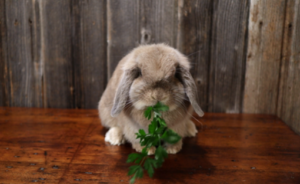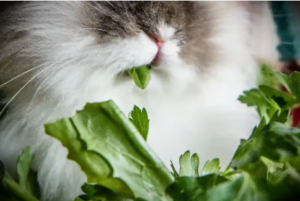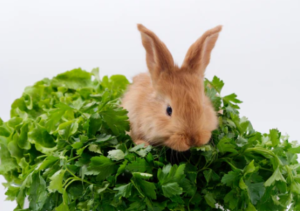Rabbits are herbivorous animals known for their delicate digestive systems and need for a well-balanced diet. As rabbit owners, ensuring that your furry friend gets the right nutrients is essential for their overall health and well-being. One common question many rabbit owners have is whether parsley can be safely included in their pet’s diet. Let’s delve into this topic with vet-approved facts and answer all possible questions related to feeding parsley to rabbits.
Is Parsley Safe for Rabbits?

Yes, parsley is safe for rabbits to eat and can be a healthy addition to their diet when given in moderation. This herb is rich in nutrients, including vitamins and minerals, making it a valuable supplement to your rabbit’s meals. However, it’s essential to understand how and when to introduce parsley to avoid any adverse effects on your rabbit’s digestive system.
Like any new food, parsley should be introduced gradually. Rabbits have sensitive gastrointestinal tracts, and sudden changes in their diet can cause digestive upset. Starting with small amounts allows you to monitor your rabbit’s response to this new food.
Do you have Query Like (Can a Rabbit Eat Oranges?) then Click the link
Nutritional Benefits of Parsley for Rabbits

Parsley is more than just a flavorful herb; it’s a powerhouse of nutrients that can benefit your rabbit. Here’s a closer look at its nutritional components and their benefits:
Vitamin C:
Parsley is an excellent source of Vitamin C, which acts as an antioxidant and supports your rabbit’s immune system. While rabbits can synthesize their own Vitamin C, the additional intake can help during times of stress or illness.
Vitamin A:
Essential for maintaining good vision, healthy skin, and a robust immune system. Parsley’s high Vitamin A content makes it a valuable part of a rabbit’s diet when balanced with other greens.
Calcium:
Important for strong bones and teeth. However, parsley contains a relatively high amount of calcium compared to other greens, so it should be fed sparingly to avoid the risk of urinary issues.
Iron:
Iron is vital for the production of hemoglobin, which helps transport oxygen throughout your rabbit’s body. This mineral is especially beneficial for young rabbits and those recovering from illness.
Fiber:
A crucial component of any rabbit’s diet, fiber aids in maintaining a healthy digestive system. Parsley’s fibrous nature supports gut motility and overall digestive health.
In addition to these nutrients, parsley is low in sugar and fat, making it an excellent option for rabbits prone to obesity or weight gain.
How to Feed Parsley to Your Rabbit

Feeding parsley to your rabbit requires a thoughtful approach to ensure it’s both safe and beneficial. Follow these steps:
Start Slowly:
Begin by offering a small sprig of parsley. Monitor your rabbit for any signs of digestive upset, such as diarrhea or decreased appetite.
Wash Thoroughly:
Always rinse parsley under cold water to remove dirt, pesticides, or chemicals. Opt for organic parsley whenever possible to minimize exposure to harmful substances.
Serve Fresh:
Ensure the parsley is fresh and vibrant. Wilted or yellowing parsley can be less nutritious and may upset your rabbit’s stomach.
Combine with Other Greens:
Parsley should be part of a varied diet that includes other leafy greens like cilantro, romaine lettuce, and dandelion greens. A diverse diet helps provide balanced nutrition.
Monitor Portion Sizes:
Limit parsley to a small handful as part of the 10% of fresh vegetables in your rabbit’s daily diet. Overfeeding parsley can lead to excessive calcium intake.
How Much Parsley Can a Rabbit Eat?

A medium-sized rabbit can safely eat about a handful of mixed greens, including parsley, per day. This ensures your rabbit receives the benefits of parsley without overloading on calcium. Balance is key—rotate parsley with other greens to provide a variety of nutrients and flavors.
Are There Any Risks in Feeding Parsley?
While parsley is generally safe, it’s essential to be aware of potential risks:
High Calcium Content:
Parsley’s calcium content is higher than that of some other greens. Excessive calcium can accumulate in the bladder, leading to urinary stones or sludge. This is especially a concern for rabbits predisposed to such issues.
Allergic Reactions:
Though rare, some rabbits may not tolerate parsley well. Signs of intolerance include loose stools, lethargy, or changes in appetite. If you notice any adverse reactions, discontinue feeding parsley and consult your veterinarian.
Pesticide Residue:
Non-organic parsley may contain pesticides that are harmful to rabbits. Always wash thoroughly or choose organic produce.
Frequently Asked Questions (FAQ)
1. Can baby rabbits eat parsley?
No, baby rabbits under 12 weeks should not consume parsley or any fresh greens. Their digestive systems are still developing, and introducing greens too early can cause diarrhea and other issues. Stick to a hay and pellet diet until they are ready.
2. Can parsley be fed daily to rabbits?
While parsley can be part of your rabbit’s regular diet, it should not be fed daily. Rotating parsley with other leafy greens ensures a balanced nutrient intake and prevents overconsumption of calcium.
3. Can rabbits eat parsley stems?
Yes, parsley stems are safe for rabbits and can provide additional fiber. The stems are slightly tougher than the leaves, which can help keep your rabbit’s teeth worn down.
4. Is curly parsley better than flat-leaf parsley?
Both types of parsley are safe for rabbits. The choice depends on availability and personal preference. Both varieties offer similar nutritional benefits and can be fed interchangeably.
5. Can parsley cause bloating in rabbits?
Parsley is not a common cause of bloating. However, overfeeding any vegetable can disrupt the gut flora and lead to gas or bloating. Always feed greens in moderation.
6. What other herbs can rabbits eat?
Rabbits can safely eat herbs like cilantro, basil, dill, mint, and oregano. As with parsley, these herbs should be offered in rotation to maintain variety and prevent overfeeding of any single type.
7. Can dried parsley be given to rabbits?
Dried parsley lacks the moisture and freshness of raw parsley but is not harmful. However, it’s less appealing and nutritious than fresh parsley. Fresh herbs are always the better choice.
8. Is parsley safe for rabbits with health conditions?
Rabbits with certain health issues, such as kidney problems or bladder stones, should avoid high-calcium foods like parsley. Always consult a veterinarian before making dietary changes for rabbits with medical conditions.
Tips for Feeding Vegetables to Rabbits
Variety is Key:
Offer a mix of greens daily to provide a range of nutrients and keep meals interesting for your rabbit.
Introduce Slowly:
Gradual introduction of new foods helps prevent digestive upset and allows you to identify any adverse reactions.
Watch for Changes:
Monitor your rabbit’s stool, behavior, and appetite when introducing new vegetables. Any negative changes should prompt a reduction or removal of the food in question.
Prioritize Hay:
Fresh hay should make up 80-90% of your rabbit’s diet. Vegetables and herbs, including parsley, are supplementary.
Consult Your Vet:
If you have any doubts about your rabbit’s diet, seek advice from a veterinarian experienced in rabbit care.
Conclusion
Parsley is a nutritious and flavorful addition to a rabbit’s diet when offered in moderation. Its rich nutrient profile supports overall health, but it’s crucial to balance parsley with other greens and prioritize hay as the main dietary component. Always observe your rabbit’s response to new foods and consult a veterinarian for any dietary concerns.
By following these guidelines, you can confidently include parsley in your rabbit’s meal plan, ensuring they remain happy, healthy, and thriving. Remember, a varied diet is the key to a rabbit’s long-term well-being.
